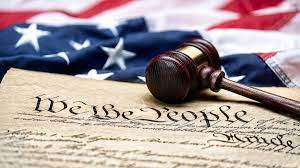English Bill of Rights
Historian Archives
William Jackson
Last Update 2 jaar geleden
The English Bill of Rights (1689)
In 1686, King James forged a political alliance with dissenting Protestants such as the Quakers led by William Penn. James promised them religious freedom in exchange for supporting his effort to secure the same for his fellow Catholics.
The following excerpt from the English Bill of Rights includes the comprehensive political settlement of the Glorious Revolution.
1. That the pretended power of suspending the laws or the execution of the laws by regal [the king’s] authority without consent of Parliament is illegal;
2. That the pretended power of dispensing with laws or the execution of laws by regal authority . . . is illegal;
3. That the commission for erecting the late Court of Commissioners for Ecclesiastical Causes, and all other commissions and courts of like nature, are illegal and pernicious [destructive];
4. That levying money [taxes] for or to the use of the Crown by pretense of prerogative [king’s authority], without grant of Parliament . . . is illegal;
5. That it is the right of the subjects to petition the king, and all commitments [imprisonment] and prosecutions for such petitioning are illegal;
6. That the raising or keeping a standing army within the kingdom in time of peace, unless it be with the consent of Parliament, is against law;
7. That the subjects which are Protestants may have arms for their defense suitable to their conditions and as allowed by law;
8. That elections of members of Parliament ought to be free;
9. That the freedom of speech and debates or proceedings in Parliament ought not to be impeached or questioned in any court or place out of Parliament;
10. That excessive bail ought not to be required, nor excessive fines imposed, nor cruel and unusual punishments inflicted;
11. That jurors ought to be duly impaneled and returned, and jurors which pass upon men in trials for high treason ought to be freeholders [property owners];
12. That all grants and promises of fines and forfeitures of particular persons before conviction are illegal and void;
13. And that for redress of grievances, and for the amending, strengthening and preserving of the laws, Parliaments ought to be held frequently.
History
The Settlement and English Bill of Rights
A new Parliament, divided between Whigs and Tories, assembled in January 1689. The two parties debated who should be the new king. The Whigs favored William. Most Tories, objecting to Parliament “electing” a king, wanted James’ Protestant daughter, Mary, as queen. A few Tories argued that James had only “deserted” not “abdicated” the throne, so he should return under certain conditions.
When William landed in England he said he was not interested in the throne. But in early 1689, he issued an ultimatum: Either Parliament proclaim him king or he would take his army back to Holland and leave England undefended and in chaos.
The Whigs and Tories finally settled on a compromise. William and Mary would technically rule as co-monarchs, but William would take charge of the government. In February 1689, Parliament offered William and Mary the crown.
At their crowning, Parliament presented William and Mary with a Declaration of Rights. This condemned the illegal acts of James, placed limits on royal authority, called for “frequent” Parliaments, and listed specific rights of Parliament and the people. Nevertheless, the monarchy kept most of its traditional powers.
Parliament later amended the Declaration to say that anyone who “shall profess the popish religion [Catholicism] or shall marry a papist, shall be excluded and be forever incapable to inherit, possess, or enjoy the crown and government of this realm. . . .” This requirement still exists today.
Parliament passed into law the amended Declaration with the consent of King William III. This document became the English Bill of Rights.
The Whigs, the main supporters of the Glorious Revolution, gained the confidence of William and passed into law the Toleration Act of 1689. This allowed moderate Protestant Dissenters, but not Catholics, to worship publicly in licensed meeting places. The Test Acts, however, still excluded the Dissenters along with Catholics from holding public office.
William did not strongly enforce the laws that continued to discriminate against Protestant Dissenters and Catholics. Many Dissenters evaded the Test Acts by taking Communion in an Anglican Church once a year just to qualify for public office. Catholics worshipped pretty much as they pleased. William also appointed bishops to the Church of England who favored a more open-minded policy toward toleration. But England still had a long way to go to before achieving true religious freedom.
Source Constitutional Rights Foundation, 601 S. Kingsley Drive., Los Angeles, CA 90005 phone 213-487-5590 | [email protected]

